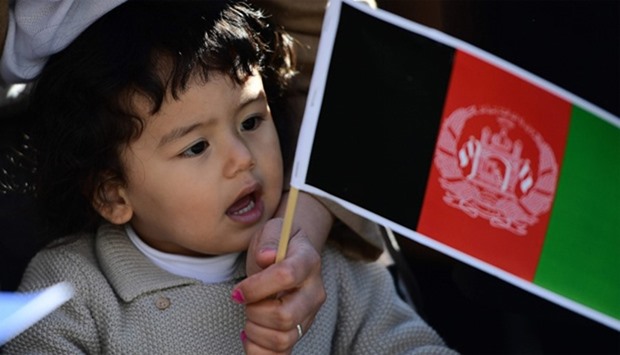* Taliban attacks in Kunduz overshadow meeting
* EU hosts dinner to relaunch peace process
Regional powers agreed to try to revive Afghanistan's stalled peace process after almost 40 years of conflict, the EU's foreign policy chief said on Wednesday, as governments began to raise some $13 billion to fund the country through 2020.
With the government in Kabul facing a resurgent Taliban 15 years after US forces helped oust the militants, more than 70 governments in Brussels promised further financial support.
The European Union is leading the effort, partly with the aim of slowing Afghan migrant flows into Europe.
As well as funding, the EU focused on getting stalled peace negotiations back on track by bringing together the United States, China, India, and Pakistan at a dinner on Tuesday night.
Federica Mogherini, who coordinates EU foreign policy, said there was an understanding ‘to work on a common basis for regional political support for the peace and reconciliation process in Afghanistan.’
‘Yesterday night we found common ground to support this process with a regional perspective and the European Union will try to facilitate this,’ Mogherini said.
There have been several attempts in recent years to broker a settlement between the Western-backed government in Kabul and the Taliban, but all have failed. Without the militants at the table, experts say it is hard to envisage a meaningful solution.
HAZARAS STAGE PROTEST
The EU and Afghanistan signed a political agreement this month to make it easier to return Afghans whose asylum requests fail.
European governments, facing increasing opposition from voters to immigration at home, have pressed Afghanistan to accept more repatriations, saying that many parts of the country, including the capital Kabul, are safe.
That policy has faced sharp criticism from aid groups and others who point to the widening Taliban insurgency across the country and the frequent suicide attacks that hit Kabul.
Several hundred members of Afghanistan's mainly Shia Hazara minority, which has been targeted by Taliban and Islamic State militants, protested outside the conference venue.
‘(President) Ashraf Ghani and his government is here for European and other countries' aid and assistance in return for accepting a deal to send us back to a war zone,’ said Ali Reza, holding a banner with the words: ‘We Will Not Go Back’.
While the West wants more social, political and financial reforms from Afghanistan, EU migration aid is not linked to the Brussels conference, but was raised by European ministers including Hungary and Bulgaria.
‘I hope that the newly signed repatriation agreement with Afghanistan will be implemented in practice,’ German Foreign Minister Frank-Walter Steinmeier told reporters.
TALIBAN PEACE TALKS?
Two people briefed on Mogherini's dinner, attended by US Secretary of State John Kerry and U.N Secretary General Ban Ki-moon among others, told Reuters that Chinese and Indian officials were willing to consider peace talks.
Pakistan continues to harbour Afghan Taliban, the United States says. India is unconvinced the militants have changed, judging by the way they rule the 10 percent of Afghan territory they control, one official said.
‘There are several countries that actually can help come together, and I urge Russia, China, Pakistan, India and Iran to think about the special role that they could play in this region in order to make a major difference ... in reaching peace with the Taliban,’ Kerry told the donor conference.
But there remain divisions about if, or when, to include Taliban militants. Even if they were invited, it is unclear whether the movement would take part.
Hope was briefly raised in 2015 when Taliban officials met the Afghan government in neighbouring Pakistan, but that process was short lived, and the Taliban insist that foreign forces must leave Afghanistan before peace talks can begin.
They are also on the offensive, and battlefield successes have exposed the defensive limits of Afghanistan's NATO-trained armed forces which are supposed to number 350,000 personnel but which have been heavily depleted by casualties and desertion.
Militants briefly reached the centre of the northern city of Kunduz on Monday, and they are testing the defences of two other provincial capitals in the south of the country.
Still, US and EU officials have been encouraged by a smaller peace agreement last month between the Afghan government and a local warlord.
Though largely symbolic, the deal grants amnesty to the warlord and his militants in return for an end to violence and respect for Afghanistan's constitution.
‘This a model for what might be possible ... I think the message from every person here would be to the Taliban: take note,’ Kerry said.

